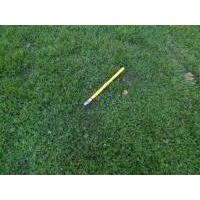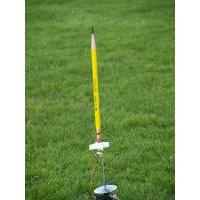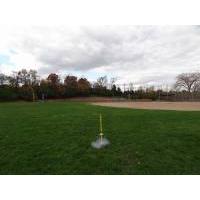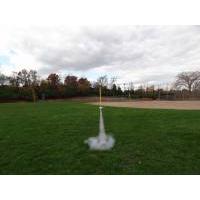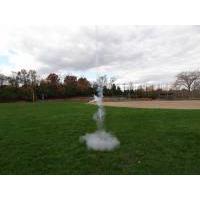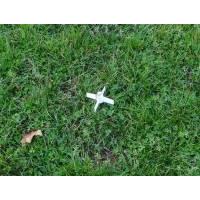| Construction Rating: | starstarstarstarstar_border |
| Flight Rating: | starstarstarstarstar_border |
| Overall Rating: | starstarstarstarstar_border |
| Published: | 2014-04-23 |
| Diameter: | 0.98 inches |
| Length: | 26.00 inches |
| Manufacturer: | Estes  |
| Skill Level: | 1 |
| Style: | Odd-Roc |
 Brief
Brief
I was thrilled when Estes brought out the Skywriter, not because of an affinity for pencil rockets, but because I could buy them and clone all the Satellite Interceptors, Mavericks and Black Brant IIIs that I wanted. I would have continued to think of the Skywriter as a donor kit had I not been in the mood to fly something different at a planned launch at B6-4 Field the following day. I had laid in a pretty nice stock of Skywriter kits and had used them as nose cone donors as I had originally planned, but the fact that I could guarantee that I could build one that Saturday night and have it ready for the launch the next day made me pull a kit out and start on it after dinner.
Components
- 2 pre-printed BT-50 body tubes
- 18mm engine mount
- PNC-50BB nose cone
- plastic fin can
- 12' parachute
- shock cord
- BT-50 tube coupler
- launch lug
Construction
Most of the construction, almost all, in fact, is centered around the motor mount. The two body tubes must be glued together, making sure to join the yellow sections and not the pre-printed "eraser" section, which goes at the bottom. When the motor mount was dry, which was fairly quick being that I used Elmer's Wood Glue and as little as possible of that, I slid it through the fin can and attached it to the "eraser" end of the body tubes with more wood glue. The fin can/engine mount butts up to the bottom of the body tube and once dry, nothing is going anywhere because the forward centering ring and the inside of the body tube are sealed together with the wood glue. In the interest of simplifying recovery I added a length of Kevlar that I tied behind the forward centering ring, but nothing about this kit suggests that it would be badly served by the traditional Estes tri-fold mount.
Finishing
Two things bear mentioning, each one fairly obvious. Be sure to join yellow to yellow when gluing the body tubes together, and be sure that the aforementioned "eraser" section is placed at the bottom of the rocket.
Flight
First flight came at the aforementioned launch at B6-4 field in November of 2013. Except for the overcast, it was a perfect day to be flying. The field was dry, the winds were almost non-existent, and my wife was out of town for the day. The Skywriter was the third flight of sixteen on the day. Since I had very little emotional investment in the rocket and conditions were perfect, I decided that it would fly on a B6-4 on B6-4 Field. No worries about losing it because I still had four of them in the basement. I loaded everything, put it on the pad, and readied the camera for the liftoff shot.
Got a little more than I bargained for. 
The rocket had barely cleared the rod when the B6-4 detonated. Parts and pieces flew everywhere. The motor casing ejected straight back and rogered the blast deflector, breaking the standoff. The nose cone and parachute continued skyward, eventually landing gently out in short-center. The body tube cartwheeled to a landing near the nose cone, while the fin can landed in deeper center. I gathered my wits about me and started gathering parts for the post-mortem. The nose cone and parachute were undamaged, as was the elastic shock cord. The body tube was a mess. Everything inside was as I expected it to be, completely charred. The tube just in front of the coupler is burned away so completely that all that is left is the yellow paper covering. The sticker decal is blistered. There is a plug of Kevlar, elastic, dog barf and the engine block at this point. Everything is fused into a tight ball. The centering ring/engine block, sewing elastic and Kevlar just crumble to the touch. The lower section is more of the same. The motor tube is charred through 3/4 of its diameter. I found the motor hook just before I left the field. The top of the hook was almost straightened out.



Flight #2 was also a little more than I bargained for, but I had no one to blame but myself. On a night when darkness was closing fast, I decided to try Sky Writer #2 on a C6-5. Not sure what I was thinking, but it likely had something to with the almost complete absence of a breeze. The Sky Writer left the pad with authority and I found myself shocked at how high it already was when the flame disappeared. I watched the overcast sky in the general vicinity of where I'd last seen it, counting to five and listening for the telltale blast of the ejection charge. I heard nothing. I waited a couple of seconds more and started watching the skies to the north, which was how the extremely light breeze was moving. Still nothing. I kept looking well past any reasonable possibility of the rocket still being in the air. The chute was reefed fairly heavily, so it had to be down, and I eventually began loading another rocket. That one would be an A8-3 flight.
Flight Rating: 4
Summary
Pros: Simple construction. No finishing. The perfect rocket for an overnight build the night before a launch.
Cons: Apparently my motor selection.
Other Reviews
- Estes Sky Writer By Dillon Frazier (February 29, 2012)
A 26-inch long rocket designed to look like a pencil. Made by Estes. An E2X model that is powered by standard engines (B6-4, C6-5, ect.). Components 2 main body tube sections Engine moun tbuilding components plastic nose cone 4 inter-connected plastic fins rubber shock cord 12 inch preassembled parachute /h2 Very easy to build, ...
- Estes No. 2 Estes Sky Writer By Carl Tulanko
The 'Sky Writer #2' rocket kit is a unique and fast building Skill Level 1 model from the Estes product line. It's a #2 pencil rocket that comes pre-painted with a white plastic 4-fin can and parachute recovery and flies on the 18mm Estes motor family to include the A8-3, B4-4, B6-4 and C6-5. At just over 26" long, this is a hearty sized model and a good looker. The kit came in a colorful bag ...
- Estes No. 2 Estes Sky Writer By Donald Besaw Jr
New E2X series rocket from Estes that looks like a standard yellow wooden No.2 pencil. It flies on A-C motors and uses a 12 inch parachute for recovery. The kit came in a plastic bag with a header card. I was impressed with the packing of this kit. The main body tube with the eraser decal and nose cone came in their own individual wrappers. The kit came with the motor mount tube, hook, and ...
#Related Reviews
Related Products
 |
 |
Flights
Sponsored Ads
 |
 |


